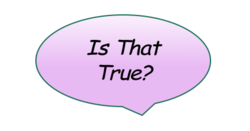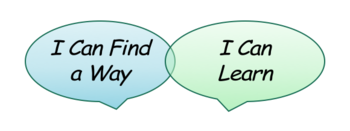Making the decision to be more aware of my use of language has given me the opportunity to look at what I say to myself. Self-talk, or as Arianna Huffington refers to it, "that obnoxious roommate in my head," is often limiting, negative, and based on information from experiences that have been frozen in time. Shifting the language we hear from that voice is a compelling way to reclaim our power.
Consider my friend Sally, for example, a busy mother of three with a deep list of responsibilities. Whenever she would forget to do something or somehow drop the ball, she could hear the voice of her mother saying, "You are so spacey and scatterbrained." For years she believed this about herself, spiraling into self-doubt each time she heard it. On realizing that the source of those thoughts dated back to her childhood, she decided to no longer believe the idea or give it any power. Now if that statement floats through her mind, she chooses to say, "No, that is NOT true! I am capable of remembering endless details. Lots of people forget one thing. Occasionally forgetting one thing does not need to define me or represent all of who I am."
Whenever the language in my head sounds limiting and negative, I know I need to step back and consider which aspect of myself is being wonky. The wonky inner voice works from fear and judgment. It can show up at any time but is more likely to surface when life throws us a curve ball, when what happens is not what we want or expect, or when we feel confused or uncomfortable.
My wonky Guardian has a voice that reminds me of old unexamined stories and beliefs. "You can't be artistic because you weren't good in that art class when you were eight years old." The excuse file is always ready and waiting. If one excuse doesn't work, the wonky Guardian can come up with five more reasons to live in fear, clinging to old stories or exaggerated risks.
My wonky Explorer insists that I always act like an adult because it believes mature human beings aren't supposed to play. It cautions me to keep my curiosity at bay and tells me to live by the shoulds and routines of life, allowing no time or permission for play, wonder, or even exploring the unfamiliar.
My wonky Artist is the soft voice in my head that keeps me from meeting my potential or following my yearnings. It compares my abilities to that of experts, makes me hesitate to take action, or declares that I can't start something because I don't already know everything I need to.
My wonky Judge urges me to steer away from uncertainty, to consider only clear-cut answers to challenges, and to avoid any type of risk, no matter what. And my wonky Champion can easily become resigned to believing there isn't a way to accomplish something I really want to do, saying, "This is just too hard. It's okay to give up."
One question has proved to be particularly helpful to me when wonky thoughts dominate my mind. Like my friend Sally, I can stop and ask, "Is that true?" I've discovered that when I say, "I can't do ___ because of ___," or "I don't do ___ because of ___," very often the real message is, "I won't." That wonky inner voice is actually my avoidance and excuse file in disguise.
My history is not my present or my future. If I say, "I am a procrastinator," I can respond with, "That used to be true, but does it need to be true now?" Or when I declare, "I never follow through," I can see that I actually can follow through right now if I choose to. Then the question becomes which voice I am going to believe? If I know that much of my self-talk is wonky, and I know I don't want that voice to rule my life anymore, I need to come up with ideas of how to change my inner dialogue.
Recently another friend mentioned that her Judge's wonky voice seemed to be the loudest in her head. As she put it, "My wonky Judge is exhausted." To begin shifting that inner-space self-talk from wonky to inspired, she now chooses to speak aloud and use the voice of her inspired Judge and Champion when she attempts a task. Verbalizing it out loud, putting an inspired voice into the space that surrounds her, seems to make a big difference in silencing the obnoxious roommate.
Because our self-talk is in our thoughts and thoughts are based on the words we choose, we each have the power to change what the voice says to us. When we shift the language of our inner space from limiting thoughts to a kind, compassionate voice that inspires and encourages us, we open ourselves up to worlds of possibility.
